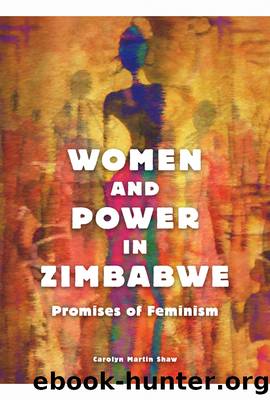Women and Power in Zimbabwe by Carolyn Martin Shaw

Author:Carolyn Martin Shaw [Shaw, Carolyn Martin]
Language: eng
Format: epub
Tags: Social Science, General, Anthropology, Cultural & Social, Women's Studies, History, Africa, South
ISBN: 9780252039638
Google: b2N2rgEACAAJ
Publisher: University of Illinois Press
Published: 2015-10-12T04:08:16+00:00
The Remains of SocialismâRetrenchment Procedures
After Mugabe lost the constitutional referendum in 2000, after people loyal to him began occupying white-owned farms, and after the violence leading up to the parliamentary elections, foreign donors started withdrawing support from many local NGOs. At that time, AWZ found itself without enough money to run its offices. The Dutch, the Norwegians, and the Danish had pulled out; the Swedish were threatening to do so. The organization was suffering and so, it seems, was the staff: at this time of high inflation and low buying power, they asked for raises, even though their salaries were higher than many at other NGOs (as noted in an external study of the group), and other organizations were already talking of retrenchment. We werenât the only ones hit hard by the political and economic fallout of Mugabe-endorsed farm invasions. Our group had only one funded project to complete, after which we might have to scale down services or staff, sell off capital, or close our doors forever. In the previous section, I dealt with the political stress that the group felt; now I turn to the financial stress and how the NGO managed to survive in a period of economic freefall.
The AWZ offices were never what you could call âabuzz.â During my time with the organization we had few visitors, though a stream of volunteers from U.S. universities came through yearly, and a fair number of researchers, interested in civil society, gender equity, and womenâs health, found the house in suburban Harare. At the main entrance, a receptionist greeted visitors. (She was sick; two of her children had died, âfailure to thrive,â it was called. Most people believed her to be HIV+. The director had begun to consider requiring a medical exam before hiring new staff. The board asked what the director would do if she were to learn that a job candidate was seropositive; would she refuse to hire the candidate? In response, the director raised the question of the cost of health care and retraining for staff but dropped the issue in the face of the boardâs insistence that there be no discrimination against seropositive candidates.) To one side of the receptionist was the library and archives room with its comfy, brightly upholstered chairs and functional office furniture. Doors leading to the Health and Legal Education coordinatorsâ offices faced a hallway beyond the receptionist. The Legal Education coordinator reported that about sixty women per quarter came by the office with questions, and more than double that number called or wrote with queries about inheritance, marriage, remittances, property ownership, court cases, and other legal matters. At the rear of the house, through a separate entrance, the editors of the magazine worked. Their offices had the busyness of a publisher, checking on facts, searching out advertisers, and meeting deadlines. By comparison, back through the main entrance, down the hallway to the left of the receptionist, the directorâs office was calm and peaceful. Only the financial assistant, whose workspace was just outside her office, could be easily seen by the director.
Download
This site does not store any files on its server. We only index and link to content provided by other sites. Please contact the content providers to delete copyright contents if any and email us, we'll remove relevant links or contents immediately.
| Central Africa | East Africa |
| North Africa | Southern Africa |
| West Africa | Algeria |
| Egypt | Ethiopia |
| Kenya | Nigeria |
| South Africa | Sudan |
| Zimbabwe |
Goodbye Paradise(3798)
Men at Arms by Terry Pratchett(2832)
Tobruk by Peter Fitzsimons(2507)
Borders by unknow(2301)
Arabs by Eugene Rogan(2292)
Pirate Alley by Terry McKnight(2217)
Belonging by Unknown(1854)
More Than Words (Sweet Lady Kisses) by Helen West(1853)
It's Our Turn to Eat by Michela Wrong(1724)
The Biafra Story by Frederick Forsyth(1653)
The Source by James A. Michener(1602)
Botswana--Culture Smart! by Michael Main(1597)
Coffee: From Bean to Barista by Robert W. Thurston(1538)
A Winter in Arabia by Freya Stark(1534)
Gandhi by Ramachandra Guha(1528)
The Falls by Unknown(1520)
Livingstone by Tim Jeal(1482)
The Shield and The Sword by Ernle Bradford(1402)
Africa: Altered States, Ordinary Miracles by Richard Dowden(1381)
